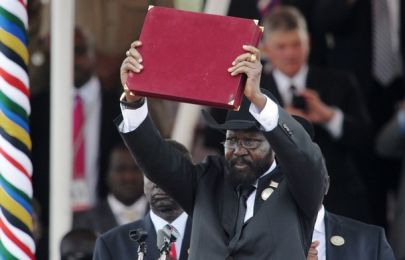South Sudan pledges transparency in finance deals
May 19, 2012 (JUBA) – South Sudan says it will allow full access to information involving deals with international financial institutions, following a report by Global Witness on Wednesday, which it recommends that the new nation “exercise caution” and total transparency in pursuing oil-backed financing.

South Sudan took with it 75 percent of production when it seceded but with the pipelines and refineries needed for exporting it’s crude all in north Sudan.
The two sides have been unable to agree on how much South Sudan should pay and after Khartoum began siphoning-off oil, Juba stopped all production in January, depriving the government of 98 percent of its income.
World Bank documents published by Sudan Tribune this month warned that the decision has left South Sudan’s economy on the verge of collapse.
To fill the void Juba is looking for finance backed by future oil revenues, either from when exports resume through Sudan, or when a new pipeline is built to the East African coast.
“It is a policy of the government that any deal with international financial institutions, be they loans, humanitarian and disaster management assistances must be made known to the general public”, Salvatore Garang Mabiordit, undersecretary in the country’s minister of Finance and economic planning said Saturday.
“Giving detailed publication of any loan agreement will be critical in preventing exploitative terms, corruption, and mismanagement from undermining immediate benefits”, reads part of the report released on Wednesday.
The Global Witness report comes after several reports indicating that government of South Sudan was securing loans, ranging from $100-500 million, to mitigate the impacts of the current economic crisis and to finance specific infrastructure projects.
The report by Global Witness campaigner Dana Wilkins, observed that there are indications that they will be, at least in part, tied to future oil revenues.
Global Witness and others have repeatedly documented the instability and capital flight that result when resource-rich developing countries take on large public debt in the absence of robust public reporting and auditing systems.
“Taking on loans with a commitment to repay them in future oil production or revenues can be risky under the best circumstances,” said Global Witness campaigner Dana Wilkins.
“The risks of corruption and mismanagement are huge, and given the importance of oil to South Sudan’s future, the Government must be extremely careful and transparent in managing these deals.”
But Mabiordit dismissed fears of mismanagement of public funds and explained that the government puts “strict procedures and regulations” indicative of its commitment to promoting transparency and accountability in financial engagements at all level of governance.
“There should be no fear in public expenditure because there are financial policies commensurate to the international standards to regulating public expenditures. These policies are being implemented. As a ministry of finance and economic planning we have sent out to all spending agencies clear instructions outlining procedures that must be followed relating to how funds should be spent”, explained Mabiordit.
The senior official explained further that the ministry is implementing austerity measures to address “financial gaps” created by the closure of oil production and denied that reserves held by the Central Bank are depleting that critical institution-building, infrastructure, and other projects may have to go unfunded.
“It is true there are challenges but the government is exerting efforts to close these gaps. The austerity measures are being implemented and we are getting loans and financial assistance from our friendly countries. Some investors are also willing to provide some financial assistance”, he explained.
Mabiordit believes that the state can survive until a new deal to resume production through Sudan with international guarantees is reached or when alternative routes are built.
He added that the government has been ready to resume negotiations with Sudan, but added that Juba was happy for the oil to remain in the ground for future use if no deal is reached.
“The oil will remain shut. This is not bad. It assures physical security instead of allowing production to benefit other people”, he said.
A United Nations Security Council resolution on 2 May asked the two sides to cease hostilities on their disputed border and resume talks on oil, border demarcation, security and other issues.
Mabiordit said that the government has the right to reach an understanding with foreign financial institutions for immediate funding and these funds will be paid against future oil production once it resumes.
However, Global Witness observed that such deals are not disclosed to the public in many countries facing similar economic challenges.
“In many cases from around the world, this process has been done behind closed doors, the wider public having no idea that their natural resources have been pre-sold, sometimes years in advance and at likely exorbitant interest rates”, the report adds.
The government of South Sudan, the report says, feels that oil-backed loans are currently necessary to prevent economic collapse but adds that it is critical that “robust protections” are put in place to minimise “future costs and consequences”.
Quoting international best practice as outlined by the International Monetary Fund, the report observed that money from these loans should be received by “a carefully controlled national bank account” managed by the Ministry of Finance and Economic Planning, and the balance, liabilities, and loan terms should be fully disclosed to the public.
“As the rightful owners of the country’s natural resources, all South Sudanese citizens should be allowed the information necessary to understand exactly what has been agreed and what the future obligations of the country will be,” added Wilkins.
“This will be one of the first major tests of the Government’s repeated commitments to transparency and accountability.”
(ST)
